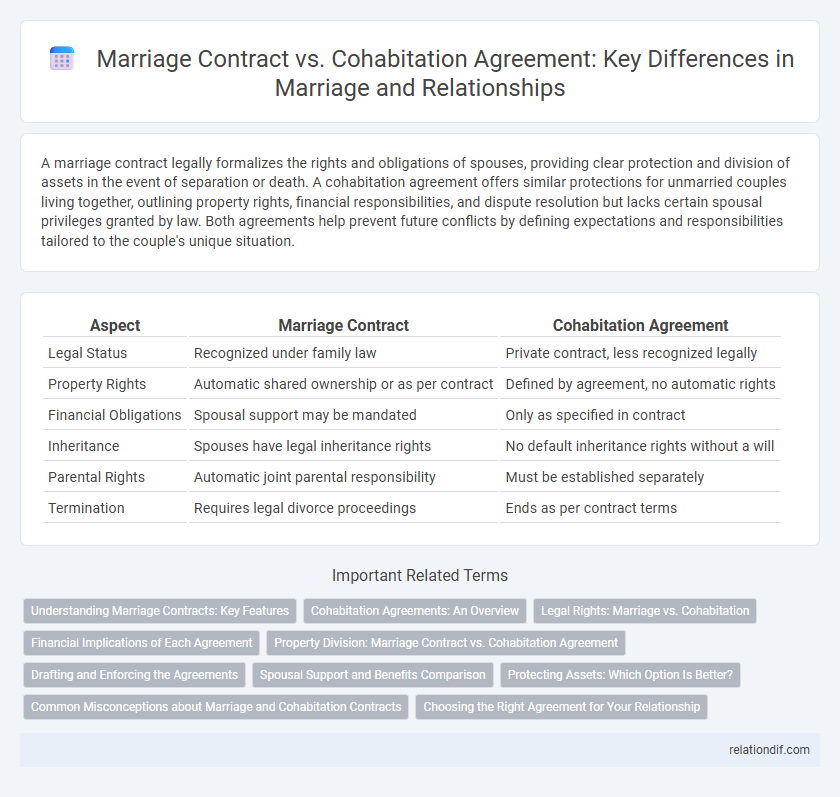A marriage contract legally formalizes the rights and obligations of spouses, providing clear protection and division of assets in the event of separation or death. A cohabitation agreement offers similar protections for unmarried couples living together, outlining property rights, financial responsibilities, and dispute resolution but lacks certain spousal privileges granted by law. Both agreements help prevent future conflicts by defining expectations and responsibilities tailored to the couple's unique situation.
Table of Comparison
| Aspect | Marriage Contract | Cohabitation Agreement |
|---|---|---|
| Legal Status | Recognized under family law | Private contract, less recognized legally |
| Property Rights | Automatic shared ownership or as per contract | Defined by agreement, no automatic rights |
| Financial Obligations | Spousal support may be mandated | Only as specified in contract |
| Inheritance | Spouses have legal inheritance rights | No default inheritance rights without a will |
| Parental Rights | Automatic joint parental responsibility | Must be established separately |
| Termination | Requires legal divorce proceedings | Ends as per contract terms |
Understanding Marriage Contracts: Key Features
Marriage contracts legally outline the rights and obligations of each spouse, covering property division, spousal support, and inheritance to protect individual interests during and after marriage. These contracts are enforceable in court, providing a clear framework for resolving disputes. Unlike cohabitation agreements, which address limited rights for unmarried couples, marriage contracts offer broader legal recognition and more comprehensive financial and personal protections.
Cohabitation Agreements: An Overview
Cohabitation agreements are legal contracts designed for unmarried couples to outline property rights, financial obligations, and dispute resolution methods, providing clarity and protection similar to marriage contracts. These agreements help prevent conflicts by clearly defining each partner's responsibilities and assets during the relationship and in case of separation. Unlike marriage contracts, cohabitation agreements offer flexibility tailored to the unique needs of non-married couples, ensuring legal recognition and security without formal marriage.
Legal Rights: Marriage vs. Cohabitation
A marriage contract legally binds spouses with comprehensive rights and obligations regulated by family law, including inheritance, spousal support, and tax benefits. Cohabitation agreements offer limited protection by outlining property division and financial responsibilities but often lack automatic legal recognition or enforcement rights granted in marriage. Courts may not extend spousal benefits or custody presumptions to cohabiting partners absent a formal agreement, making marriage a stronger framework for legal security.
Financial Implications of Each Agreement
A marriage contract legally defines spousal financial rights and obligations, including property division, spousal support, and inheritance, providing formal protection and clarity during marriage and potential divorce. In contrast, a cohabitation agreement primarily addresses financial arrangements for unmarried partners, specifying asset ownership, debt responsibility, and support, but often lacks the extensive legal recognition of marriage contracts. Understanding these differences is critical for couples to safeguard their financial interests and reduce disputes.
Property Division: Marriage Contract vs. Cohabitation Agreement
A marriage contract, often referred to as a prenuptial agreement, clearly outlines property division rights and obligations upon divorce or separation, providing legal certainty and enforceability. Cohabitation agreements, while offering some protection for property claims between unmarried partners, generally lack the comprehensive statutory backing of marriage contracts, leading to potential complexities in asset division. Courts tend to enforce marriage contracts with greater consistency, whereas cohabitation agreements require more detailed documentation to protect individual property interests effectively.
Drafting and Enforcing the Agreements
Drafting a marriage contract involves detailed legal provisions regarding asset division, spousal support, and inheritance rights, providing clear protections tailored to married couples under family law. A cohabitation agreement outlines similar terms for couples living together without marriage but often requires more precise language to address the absence of automatic spousal rights and legal recognition. Enforcing these agreements depends on jurisdictional variations, with marriage contracts generally upheld more consistently, while cohabitation agreements may face stricter scrutiny to ensure fairness and voluntariness.
Spousal Support and Benefits Comparison
Marriage contracts typically outline clear spousal support obligations and entitlements, offering legally enforceable benefits such as alimony and pension rights. Cohabitation agreements provide more limited protections, often requiring specific terms to be negotiated for spousal support and usually lacking automatic entitlement to benefits like healthcare or inheritance. Understanding the differences in legal recognition and financial rights between these agreements is crucial for partners planning their future financial security.
Protecting Assets: Which Option Is Better?
A marriage contract, or prenuptial agreement, offers comprehensive protection of individual assets by legally defining property rights and financial responsibilities before marriage. Cohabitation agreements primarily address asset division and financial obligations for unmarried couples but may lack the enforceability and clarity provided by a marriage contract. When prioritizing asset protection, marriage contracts generally provide stronger legal safeguards and clearer terms for safeguarding individual wealth.
Common Misconceptions about Marriage and Cohabitation Contracts
Marriage contracts and cohabitation agreements both address legal and financial arrangements but are often misunderstood in terms of rights and obligations. Many believe marriage automatically ensures joint property rights, whereas cohabitation agreements explicitly define asset division and support responsibilities for unmarried couples. Misconceptions include assuming cohabitation grants spousal benefits or that marriage eliminates the need for detailed contracts, leading to potential legal disputes.
Choosing the Right Agreement for Your Relationship
A marriage contract provides legally binding rights and obligations recognized by the state, typically covering property division, spousal support, and inheritance in case of divorce or death. In contrast, a cohabitation agreement is designed for unmarried couples, establishing terms for property ownership, financial responsibilities, and dispute resolution without the legal framework of marriage. Selecting the right agreement depends on your relationship status, financial goals, and legal protections desired to safeguard both parties effectively.
marriage contract vs cohabitation agreement Infographic

 relationdif.com
relationdif.com